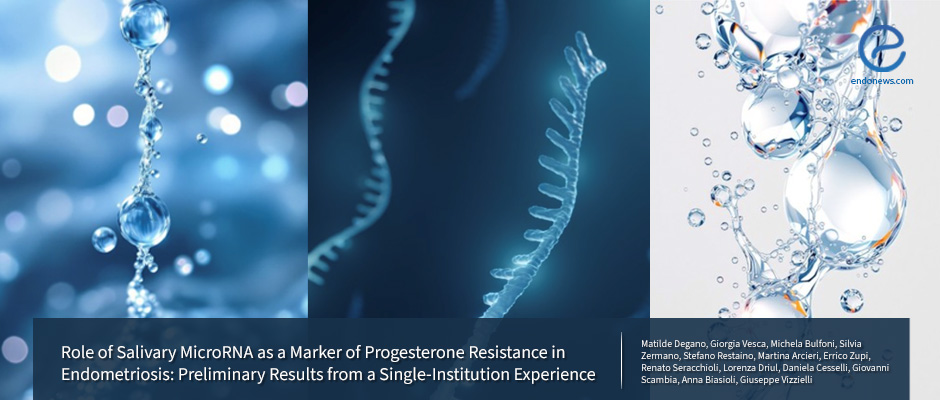Salivary miRNAs as Biomarkers for Endometriosis
Jun 11, 2025
New Study Shows Saliva miRNA Signature May Revolutionize Endometriosis Diagnosis and Therapy Monitoring
Key Points
Highlights:
- miR-3168, miR-93-5p, and miR-200a-3p found in saliva may serve as potential non-invasive biomarkers for both the diagnosis of endometriosis and prediction of progesterone therapy response.
Importance:
- Some salivary miRNAs could help reduce diagnostic delays in endometriosis and enable the development of personalized treatment strategies.
What’s done here:
- A feasibility study was conducted by sequencing miRNAs in saliva from
- Women with endometriosis who responded to progesterone therapy,
- Women who did not respond, and
- Healthy controls.
- A total of 28 samples were analyzed to identify differential miRNA expression patterns.
Key results:
- Women in each group showed distinct salivary miRNA signatures.
- miR‑93‑5p was significantly lower in endometriosis patients compared to controls.
- Non-responders showed downregulation of let‑7c‑5p, miR‑200a‑3p, and miR‑3168 compared to responders.
- The identified miRNAs clustered samples effectively, suggesting a biologically meaningful signature.
Limitations:
-
Small sample size, reducing statistical power; absence for experimental validation of identified miRNAs;and potential for misclassification in control group (some may have undiagnosed endometriosis).
From the Editor-in-Chief – EndoNews
"The persistent challenge of delayed diagnosis in endometriosis calls for bold innovation—and this study delivers just that. By identifying a salivary microRNA signature capable of both diagnosing the disease and predicting treatment response, the authors bring us closer to a long-awaited goal: a simple, non-invasive, and personalized diagnostic tool.
While larger, confirmatory studies are essential, the implications are profound. A saliva-based miRNA panel could spare patients from years of uncertainty and invasive procedures, while also guiding therapeutic decisions from the outset. This is more than a technical advance—it’s a paradigm shift in how we think about early detection, individualized care, and the future of endometriosis management."
Lay Summary
Small molecules called micro-RNAs (miRNAs) found in saliva could be potential biomarkers, not only to detect endometriosis in a non-invasive manner but also to predict the response of the disease to treatment.
This promising idea comes from a new study published in Biomolecules, where researchers suggest that a non-invasive saliva test could reduce diagnostic delays and help personalize treatment for women with endometriosis.
To explore this possibility, Dr. Giuseppe Vizzielli and his team from the University of Udine in Italy analyzed salivary miRNAs in three groups of women:
- Women without endometriosis
- Women with endometriosis who responded to progesterone-based therapy, and
- Women with endometriosis who did not respond to progesterone treatment.
They confirmed that saliva miRNA sequencing is feasible and revealed that each group had a distinct miRNA signature. Importantly, certain molecules—miR-3168, miR-93-5p, and the miR-200a family—stood out as potential indicators of both disease presence and treatment response.
While these findings are preliminary and need further validation in larger studies, they open a new window into using simple saliva tests to better diagnose and manage endometriosis—potentially transforming care for millions of women worldwide.
Research Source: https://pubmed.ncbi.nlm.nih.gov/40305232/
diagnosis prognosis biomarker

